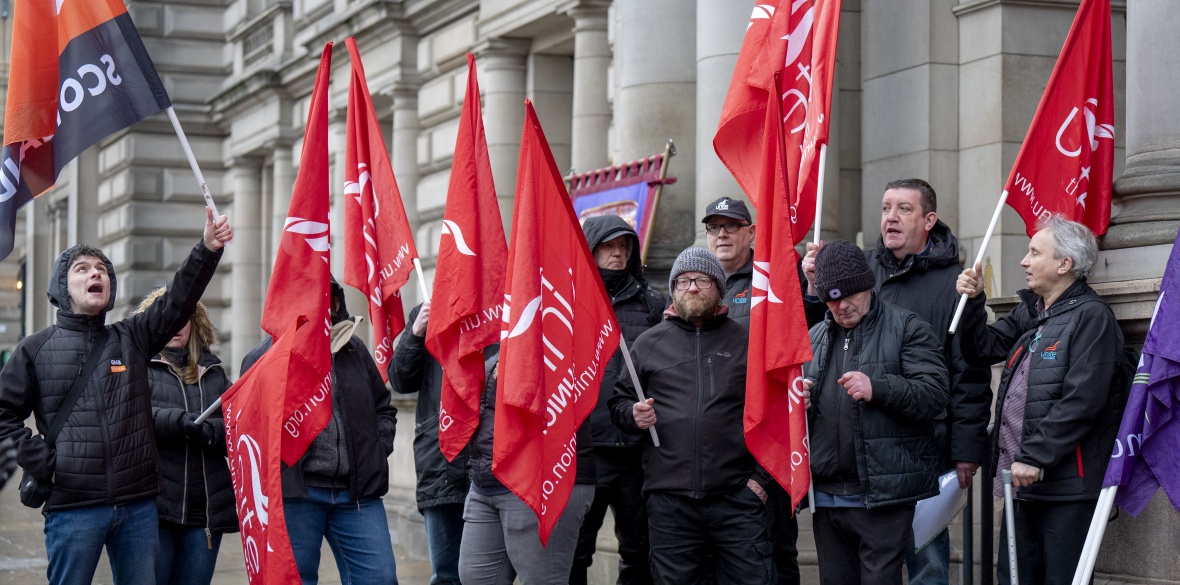This is the last article you can read this month
You can read more article this month
You can read more articles this month
Sorry your limit is up for this month
Reset on:
Please help support the Morning Star by subscribing here
ONLY a few years ago as the pandemic ravaged the globe, Scotland’s public-sector workers were hailed as heroes. People stood on their doorsteps, clapping in gratitude for the tireless NHS staff and all those in public services who kept society running during the darkest days of crisis.
Fast forward to today, these same workers find themselves on the front lines again — not against a pandemic, but against the government, politicians and mainstream media who seem determined to dismantle the public services workers fought so hard to sustain.
Across Scotland, local councils are leading an assault on the foundations of public-sector work. Aberdeen City Council are planning to unilaterally impose a 35-hour workweek, cutting workers’ wages by up to 104 hours per year. This will impact roughly 3,300 roles if this disgraceful proposal goes ahead.
In West Dunbartonshire, plans to replace public holidays with annual leave will strip workers of both money and much-needed rest. It will worsen workload pressures on staff who already work beyond their contracted hours.
This isn’t just about cuts — it’s a direct attack on the dignity of workers.
Make no mistake: these fire-and-rehire tactics will not go unchallenged by Unite. Let me be clear when I say any attempt to adopt fire-and-rehire practices by Scottish councils will be resisted with every single tool at Unite’s disposal including widespread industrial action.
The Scottish government claims to support “fair work,” but their current radio silence speaks volumes. If government ministers do not speak up, then it will consign the Fair Work principles to utter irrelevance. It will validate the concerns which we have that the principles are nothing but empty words and worthless in practice.
If this is permitted in our public services with the Scottish government’s tacit blessing, then what sort of message does that send to the private sector?
This is about more than just resistance; it’s about demanding investment, stability, and respect for workers. British and Scottish governments must stop the farcical cycle of inadequate, short-term budgets that leave services underfunded and workers underpaid. This is a fight to improve service provision along with pay, terms and conditions.
Unite’s demands for this year’s local government pay claim are simple and essential: an above-inflation increase of £1 per hour, or 6.5 per cent, whichever is greater; an increase in annual leave entitlement; and a pilot reduction of the working week with no loss of pay.
These demands reflect the hard work, dedication, and professionalism of our members. If public-sector bosses can award themselves grossly inflated pay packages with our money, then why should the workers who make these services run be any less worthy?
Take Scottish Water as a case example. Alex Plant receives nearly half a million pounds in remuneration pay, while his executive team rakes in £1.15 million of public money. Yet, Scottish Water is refusing to award our members a decent offer, which is why our 500-strong membership is on the verge of industrial action.
Higher and further education institutions are facing similar attacks, driven by years of underinvestment and financial mismanagement. At Strathclyde University, Unite members are set to take two weeks of strike action from March 10 in response to an attempt to cut their pensions. The university currently holds a £100 million surplus.
Similarly, at Dundee University, a looming £30m deficit is being used as an excuse for redundancies and cuts to workers’ rights.
Unite has offered to explore ways of improving the short-term financial positions of universities and colleges, but it should come as no surprise that management is refusing to do this. Again, where the Scottish government has a clear responsibility to hold the universities to account, it remains silent.
The refusal to discuss real solutions, such as tackling excessive executive pay, shows where their priorities truly lie: not with the workers who sustain our education institutions, but with fat-cat executives dining out on the public purse.
Even in the NHS, which has seen some investment, the Scottish government is failing to protect services and the workers who make it function. We are still seeing the closing and cutting of community mental health and health visiting services. Without these vital services, how can sustainable care be provided in the community?
In recent pay talks, the government agreed to a reduction in the working week, now they are backtracking. Broken promises which leave workers under more strain, and weaker conditions, and it is quickly eroding morale.
The Scottish government and NHS bosses must be held accountable because they are the ones enabling this situation to take hold and spread.
In August of last year, Unite revealed the grim findings of a survey conducted among Scottish Ambulance Service workers — record levels of abuse, burnout, and stress. The workers, already bearing the brunt of an overstretched system, are being asked to do more with less.
The Scottish government’s promises are worth nothing if they cannot deliver the reduction of working hours — simply put how can we trust them to uphold any agreement in the future?
Unite will not let these attacks on public-service workers go unchallenged. We are putting politicians on notice that they will be held to account for their attacks and failures to support public-sector workers.
We will take this fight to every constituency, town and city hall across Scotland. We will ensure that the state of our public sector takes centre stage in the upcoming Scottish parliamentary elections in 2026.
Our fight to protect workers and public services in Scotland begins anew. We will not be silenced — and we are determined to win.







